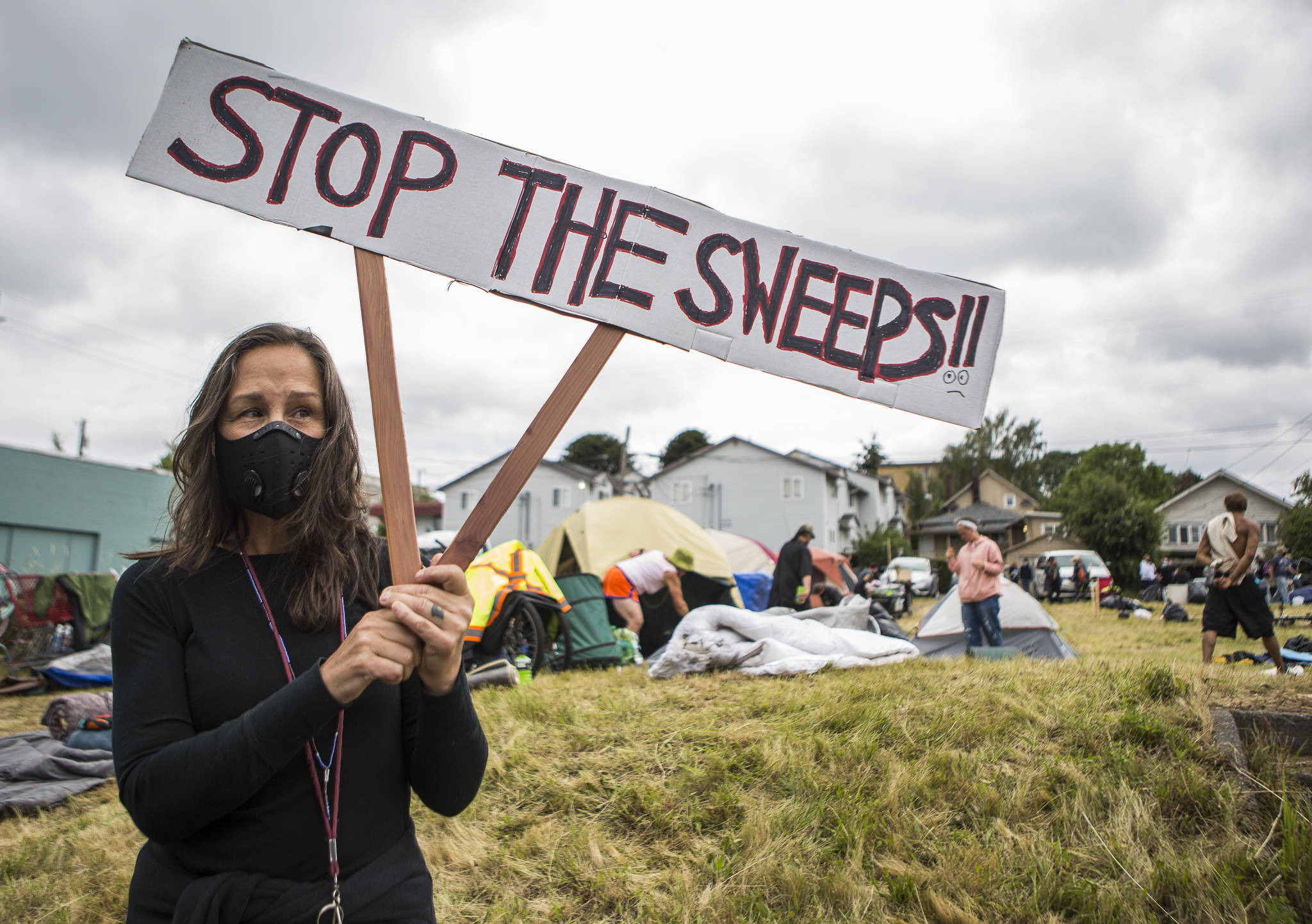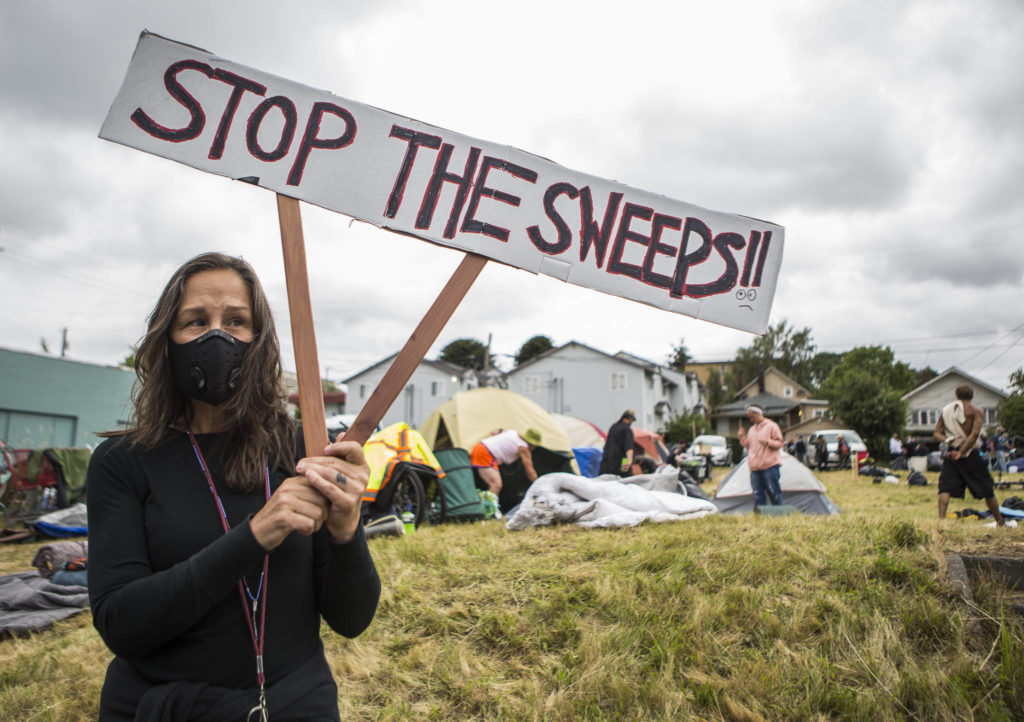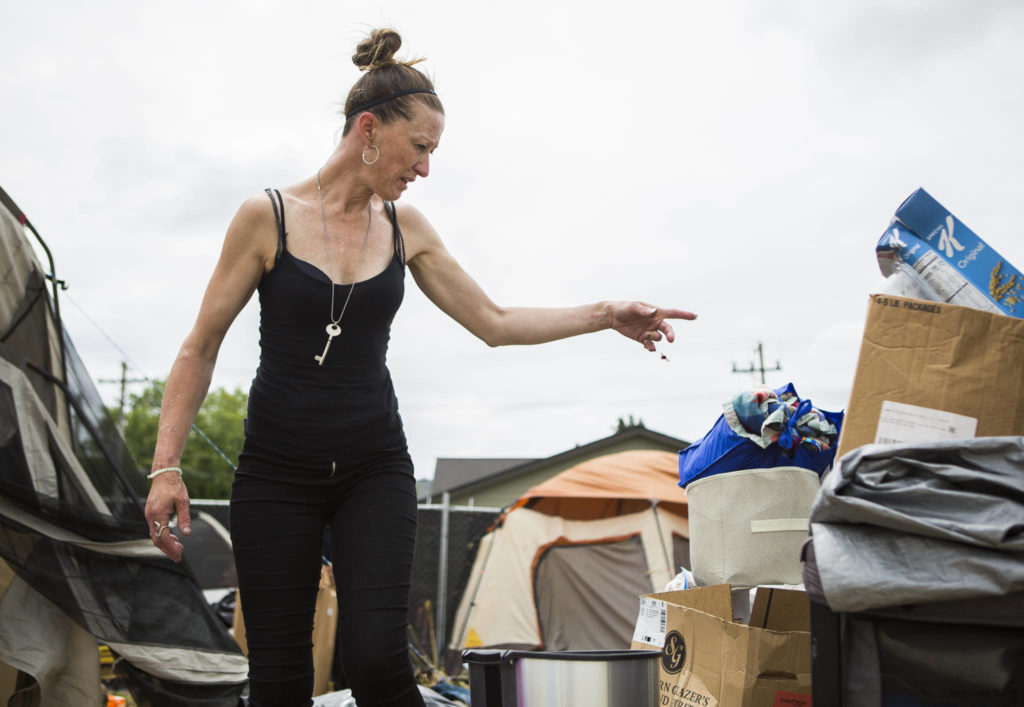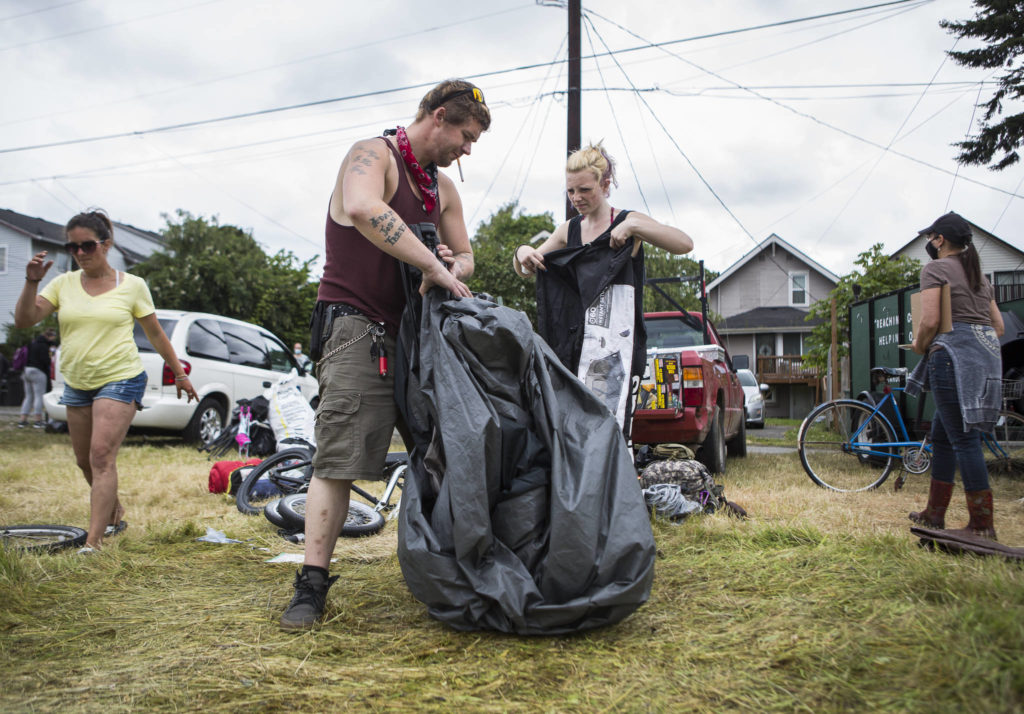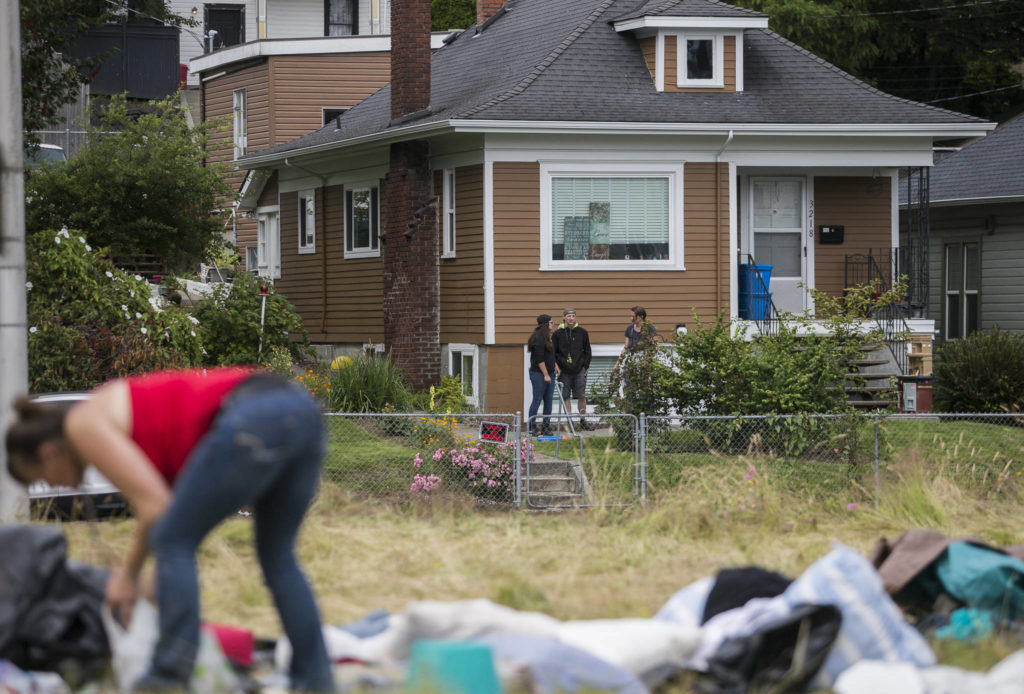EVERETT — Kimberly Bailey had packed all of her belongings, some stuffed in trash bags, some strapped to a rolling cart, on the edge of a grassy lot on Rucker Avenue on Thursday.
It was about 12:30 p.m. — half an hour after a city-imposed deadline requiring Bailey and every other person camping there to leave the property.
She still didn’t know where she would go that night.
Bailey, 44, was among more than 100 homeless people who cleared the lot on Thursday, heeding an order city code enforcement announced less than 24 hours earlier.
“They displace us, then they get upset because we’re all over the place,” she said. “It makes no sense.”
City officials have said the unauthorized encampment — crowded with tents amid the coronavirus pandemic — threatened public health and safety. But many of those left on the property at noon on Thursday said the camp offered a central location where unsheltered people could get help from local nonprofits stationed there.
“When we’re here, when you need something, you’ve got people you can ask,” Bailey said as she began disassembling her six-person tent.
Local advocates for homeless people established the camp as a last-minute stopgap after Snohomish County government leaders dispersed another encampment in the heart of downtown Everett near the jail on Sunday amid safety concerns for people called in for jury duty, as well as county employees. Robert Smiley, founder of the nonprofit The Hand Up Project, leased the privately owned lot at 3217 Rucker Avenue from a longtime friend, Alan Jackson, to provide a place to stay for those who had nowhere to go.
People were only going to be allowed to camp there until Aug. 2, Smiley said. In the meantime, he and other volunteers were going to connect them with housing and other resources.
City code, however, requires such encampments to be permitted.
“The encampment was neither a safe nor sanitary location to house individuals experiencing homelessness. It also violated city laws and has been negatively affecting surrounding properties,” Mayor Cassie Franklin said in a statement released around 5 p.m. Thursday. “The City has worked to enforce its codes while respecting the legal rights of both the property owner and the campers. We issued an emergency order yesterday requiring the property owner to abate this unauthorized use by noon today.”
She added that the city and social service providers have offered shelter, housing vouchers and treatment programs to help relocate people in the camp.
“We appreciate the compassion and help of individuals and organizations in our community who have also been working to support our unhoused neighbors,” Franklin said.
In a letter sent early on Thursday, the American Civil Liberties Union of Washington urged the city to rescind the order disbanding the camp, saying code enforcement officials provided insufficient notice and no other place for the campers to stay.
“Forcibly dispersing some of the City’s most vulnerable residents – who have nowhere else to go – throughout Everett runs afoul of public health expert guidelines pertaining to COVID-19 and will cause great harm,” Breanne Schuster, a staff attorney for the ACLU of Washington, wrote in the letter to the mayor, Police Chief Dan Templeman, and City Council members.
Schuster pointed to Centers for Disease Control and Prevention guidelines that say authorities should “allow people who are living unsheltered or in encampments to remain where they are,” because dispersing them severs ties with service providers and increases the likelihood of infectious diseases spreading.
The ACLU attorney also cited laws that prohibit “cruel punishment” of homeless people in public spaces and afford them the same property protections as those in brick-and-mortar housing.
Businesses near the lot have objected to the encampment, saying it created unsafe and unsanitary conditions that put employees at risk and deter customers.
Others spoke out against the city’s decision to break up the camp.
As the tents came down, a handful of protesters gathered on the sidewalk along Rucker Avenue.
“I’m tired of my tax dollars being used to traumatize people over and over again,” said Edmonds resident Cathy Decker who held a sign that read “Stop the Sweeps.”
“The city (and) the county have more than enough resources to do right by these people, and they’re just not doing it,” said Decker, 56. “During a pandemic, it’s unimaginable why they’re dispersing people like this.”
The coronavirus crisis has limited beds available at local shelters and stymied the operations of many organizations that typically serve people who are homeless.
City and county officials have said they are working toward long-term solutions that will get people off the street.
Many people were offered resources at the encampment near the jail before it was dispersed, but refused the help, according to the county.
Everett City Councilwoman Liz Vogeli suggested in an email to city and county leaders on Thursday morning that the camp be moved to a piece of county-owned property at Airport Road and 100th Street SW near Paine Field
“We can do the right thing and get these folks the help and space they need,” Vogeli said in the email.
The county, though, is already leasing that land to another party.
Vogeli, who was at the Rucker Avenue site Thursday afternoon, commended the nonprofits that organized the encampment.
County Councilwoman Megan Dunn, who was also there helping with the cleanup, said the city and county could have worked together to establish a “sanctioned tent city” with more time.
“I think we need long-term supportive housing, and we need more emergency shelter,” she said. “This is showing the need for more emergency shelter.”
The nonprofits working at the encampment were able to get more than a dozen people off the street in just a few days, said Penelope Protheroe, president and CEO of Angel Resource Connection. Some people got beds in detox facilities, which provide a safe place to sober up.
On Thursday, the Salvation Army was also distributing motel vouchers.
Those staying at the camp had filled out surveys indicating their needs, from housing to substance abuse treatment, Protheroe said. Each tent was assigned a number so that service providers could tell who was staying where.
“We would have helped so many people,” Protheroe said. “It’s just heartbreaking that the city didn’t work with this. We weren’t going to do this forever.”
As she watched the encampment disperse, Nicole Fingarson was unsure where she would sleep on Thursday night.
“I have no idea,” said Fingarson, 38. “It has been hard to find a place.”
Around her, people folded tarps and snapped apart tent poles. Volunteers offered space in vehicles to transport campers’ possessions.
“I think they should allow us to stay here. What are we supposed to do?” she said. “A lot of us don’t know where to go to get help. Or we get turned down.”
Rachel Riley: 425-339-3465; rriley@heraldnet.com. Twitter: @rachel_m_riley.
Talk to us
> Give us your news tips.
> Send us a letter to the editor.
> More Herald contact information.
